
For the year ended 31 July 2024


For the year ended 31 July 2024
To be the leader of land and environmental education and training in the South East, renowned for our cutting-edge practice.
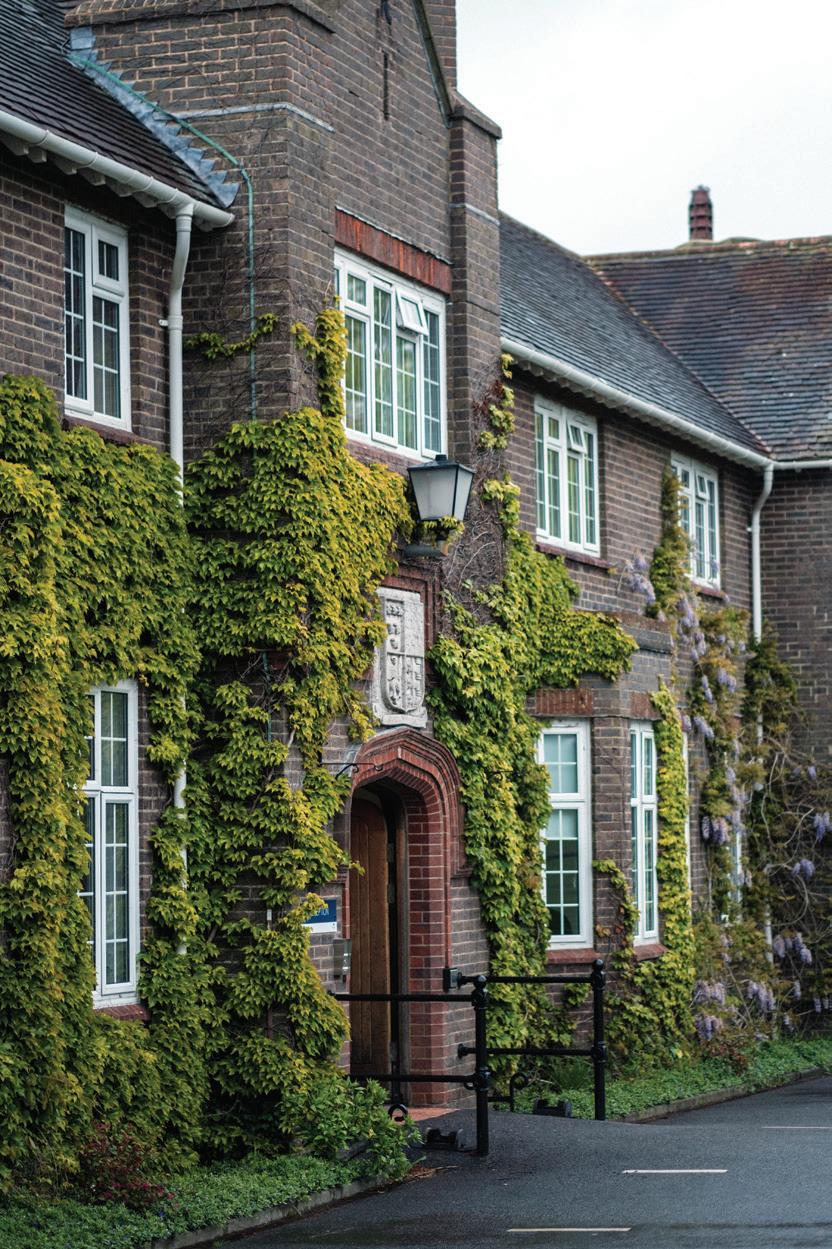




I am delighted to present to you our Annual Report for 2023/24. As I reflect on the past year I do so with a sense of true pride. One highlight of the year was being awarded the Queen’s Anniversary Prize in recognition of our work as the sole innovator and developer of industry-led training and education programmes supporting the growth and sustainability of the English and Welsh wine industry. This honour granted every two years by the reigning Monarch, celebrates excellence and innovation within education, and is the highest accolade to receive within the Further & Higher Education sector. In addition, an Oftsed inspection in March 2024 resulted in the College being graded as Outstanding in Personal Development and across our provision for apprenticeships, adult learners, and high needs learners with an overall ‘good’ effectiveness grade. Plumpton College also scored the top assessment of ‘strong’ for its approach to meeting the skills needs of the region and is one of a few colleges nationally to attain this accolade. These achievements are testament to the leadership team, the teaching staff, support staff and the learners who all contribute to make Plumpton College the place it is. This report not only presents key highlights of our successes and developments of the past twelve months, but it sets an agenda at Plumpton College that is both dynamic and responsive to the needs of our learners, the local community and across the region.
Despite the many challenging external factors that the sector continues to face the college has continued to demonstrate their responsiveness and ability to deliver excellence through our teaching and learning, support for our students and parents, research, and stakeholder engagement. We remain proud of all our student achievement and retention rates and their involvement in extracurricular activities alongside strong student satisfaction. At a time when the recruitment and retention of staff remains challenging nationally our staff satisfaction rates remain strong and our staff turnover below national benchmarks for the sector. This is testament to our whole college approach to investing in, supporting, and developing our staff body as well as creating a culture within the college in which people feel empowered, valued, and trusted to make a real contribution.
The role that Plumpton College plays across the region, collaborating with key partners across the land-based sector and the community is as important to us as the quality of education and skills training that we provide. We remain an active partner in the development of the Sussex Local Skills Plan (LSIP) and the College plays a critical role in ensuring that the education and training we offer is aligned to the local skills and employment landscape. Working in partnership with a range of stakeholders including local schools, County Councils, Chambers of Commerce, local employers, and national landbased bodies remains a priority for the college and
has continued to flourish. Such partnerships have included the delivery of national apprenticeship contracts with the Royal Horticultural Society, the National Trust and Tesco Booker and with the Royal Society for Veterinary Science and the University of Greenwich as our Higher Education partners.
Being adaptable, agile, and most importantly financially prudent over recent years, has meant that we have continued to invest in our facilities across the college for our students and the local and regional land-based economy. Aligned to our strategic priorities, recent capital developments have resulted in the opening of an AgriFood Centre, new pig unit, a biosecurity centre, introduced robotic milkers and opened new butchery and baking training facilities. We continue to be the lead landbased college in an Institute of Technology initiative across the South East and have recently invested in enhancing our veterinary science facilities.
“We continue to be the lead land-based college in an Institute of Technology initiative across the South East”
As a Corporation, we are an ambitious board offering pace, challenge and stretch. The Board remains strong with expert governors in the quality and breadth of its membership, and we continue to focus on ensuring that our membership is representative of the community we serve. We remain resolute that the college will provide the opportunity for our students, stakeholders, and partners to come
together to share ideas and knowledge, to learn from our innovative curriculum and practices to help shape the future of a sustainable land-based sector and the leaders within it. Through sound risk management and a determination to identify and address emerging issues, our Governors are in a strong position to closely monitor the various challenges that we face.
As always, it is our people who make all the difference in what we do. On behalf of the Corporation, I would like to take this opportunity to express our deepest gratitude to our students, staff and parents/carers for their versatility and positive response to the challenges over the last year.
Whatever the future has in store, we have no doubt that the wider community of Plumpton College can continue to apply its collective ingenuity and determination to inspire students, sustain and grow. The coming year will be another year of much change. The work we have done together puts us in a strong position to capture the opportunities and navigate the challenges it will bring. In the following annual report, we share just a few examples of the ways in which we are already doing just that. Plumpton College has never been stronger, nor more important for the local and national land-based economy. I look forward to working and continuing this exciting journey with them over 2024/25.
J Dougill Chair of Corporation

Students
The Governors of Plumpton College are pleased to present their report and the audited financial statements for the Year Ended 31 July 2024.
The land-based sector requires more people than ever before to be trained and educated, and at a higher level than ever before. Therefore at the heart of our vision is an ambition to achieve targeted growth, underpinned by our college values.
• Ambitious and progressive
• Enterprising
• Professional
• Supportive
• Passionate about everything we do
To be the leader of land and environmental education and training in the South East, renowned for our cutting-edge practice.
To inspire and equip our students with the skills, knowledge and attributes which meet the future needs of industry.
To play a transformational role in the environmental sustainability of land-based industries, showcasing best practice and integrating the highest standards of sustainability into our curriculum.
To be a diverse and vibrant community in which staff and students embody our values, have a strong sense of belonging and flourish.
To have a nurturing and collaborative relationship with our local community and employers which enhances both the experience of our students and the professional development of the workplace.
To attract, develop and retain a highly skilled, ambitious team of staff empowered to deliver our core purpose.
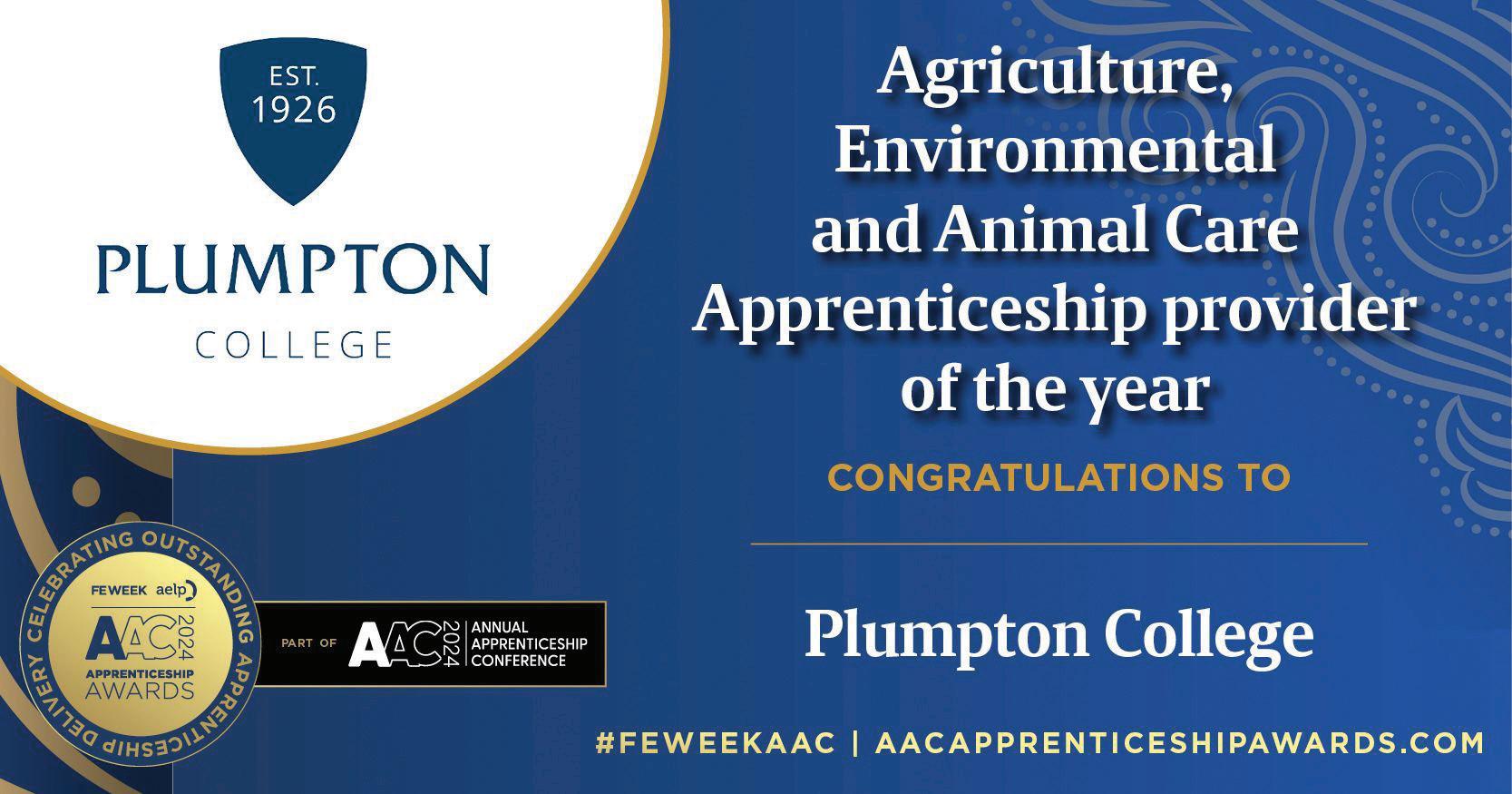
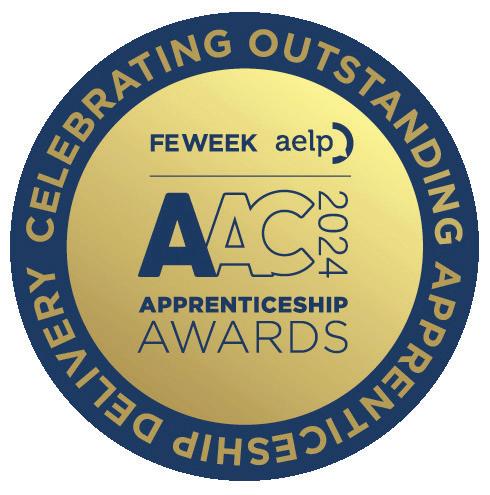
College named Apprenticeship Provider of the Year
Plumpton College was named the ‘Agriculture, Environmental & Animal Care Apprenticeship Provider of the Year’ at the FE Week & AELP Apprenticeship Awards 2024, marking its second consecutive year of national recognition for apprenticeship excellence. With a 96% achievement rate in 2023, the college delivered outstanding programmes supported by expert trainers, modern facilities, and strong employer partnerships, preparing a skilled workforce for land-based industries.
Horticulture students win ‘Gold’ at BBC Gardeners’ World
Students from Plumpton College won a Gold Medal at the BBC Gardeners’ World Spring Fair 2024 with their innovative garden design, “Hort Couture – Waste Not Want Not,” which creatively incorporated upcycled materials to address the theme of ‘Gardening in a Challenging Climate.


College receives Outstanding results in Ofsted inspection
Achieving outstanding results in its recent OFSTED inspection, Plumpton College excelled across multiple key areas, including adult education, apprenticeships, personal development, and provision for learners with high needs. Inspectors highlighted the college’s inclusive learning culture, its strong partnerships with land-based industries, and its success in preparing students for successful careers through tailored programmes and exceptional teaching. With ongoing investments in state-of-the-art facilities, such as the new Veterinary and Animal Science Institute of Technology set to open in 2025, the college demonstrated its commitment to providing cutting-edge education and training for the land and environment sector.
Plumpton College was awarded the Queen’s Anniversary Prize, the highest national honour in education, for its pioneering work in wine education and its significant impact on the English and Welsh wine industry. Recognised for developing industryled programmes since 1985, the college has trained over 95% of the UK’s vineyard and winery staff, driving innovation and sustainability while establishing English sparkling wine as a global competitor.


Outstanding achievement and recognition for two students in the Land-based & Environment Learner Awards 2023
Plumpton College students
Sophie Walker and Charlie Kifford were recognised at the inaugural Land-based & Environment Learner Awards 2023, with Sophie winning the Veterinary Nursing Learner of the Year Award and Charlie earning runner-up in the Agriculture category for their exceptional achievements and dedication.
Two Plumpton College Students Win the NFU Mutual’s ‘Enhancing Vineyard Sustainability Award 2023’
NFU Mutual awarded its inaugural £5,000 Enhancing Vineyard Sustainability Award to Plumpton College MSc students Tyler Kenyon and Ralph Matzner for their innovative research projects focused on sustainable solutions in the wine industry.

OUR YEAR IN NUMBERS 27%
INCREASE IN APPLICATIONS TO UNIVERSITY
INCREASE IN 16-18 COURSE APPLICATIONS 18% INCREASE IN CAREERS SESSIONS 92% PASS RATES FOR VARIOUS L1 - 3 AGRICULTURE, EQUINE, MOTOR VEHICLE & COUNTRYSIDE MANAGEMENT COURSES
HIGHEST LEVEL OF STAFF RETENTION IN 10YRS 25%
HIGHEST NUMBER OF RESIDENTIAL STUDENTS BY AUG ‘23 IN 8+ YRS
NEARLY £300,000 OF DIGITAL TECHNOLOGY INVESTMENTS FOR 24/25
100%
STUDENT RETENTION IN AGRICULTURE, MOTOR VEHICLE & SUPPORTED INTERNSHIPS
THE LAUNCH OF 15 HE PROGRAMMES IN PARTNERSHIP WITH UNIVERSITY OF GREENWICH MET OUR 5% REDUCTION TARGET FOR ELECTRICITY USAGE
HIGHEST STAFF SATISFACTION RATES TO DATE AT PLUMPTON COLLEGE
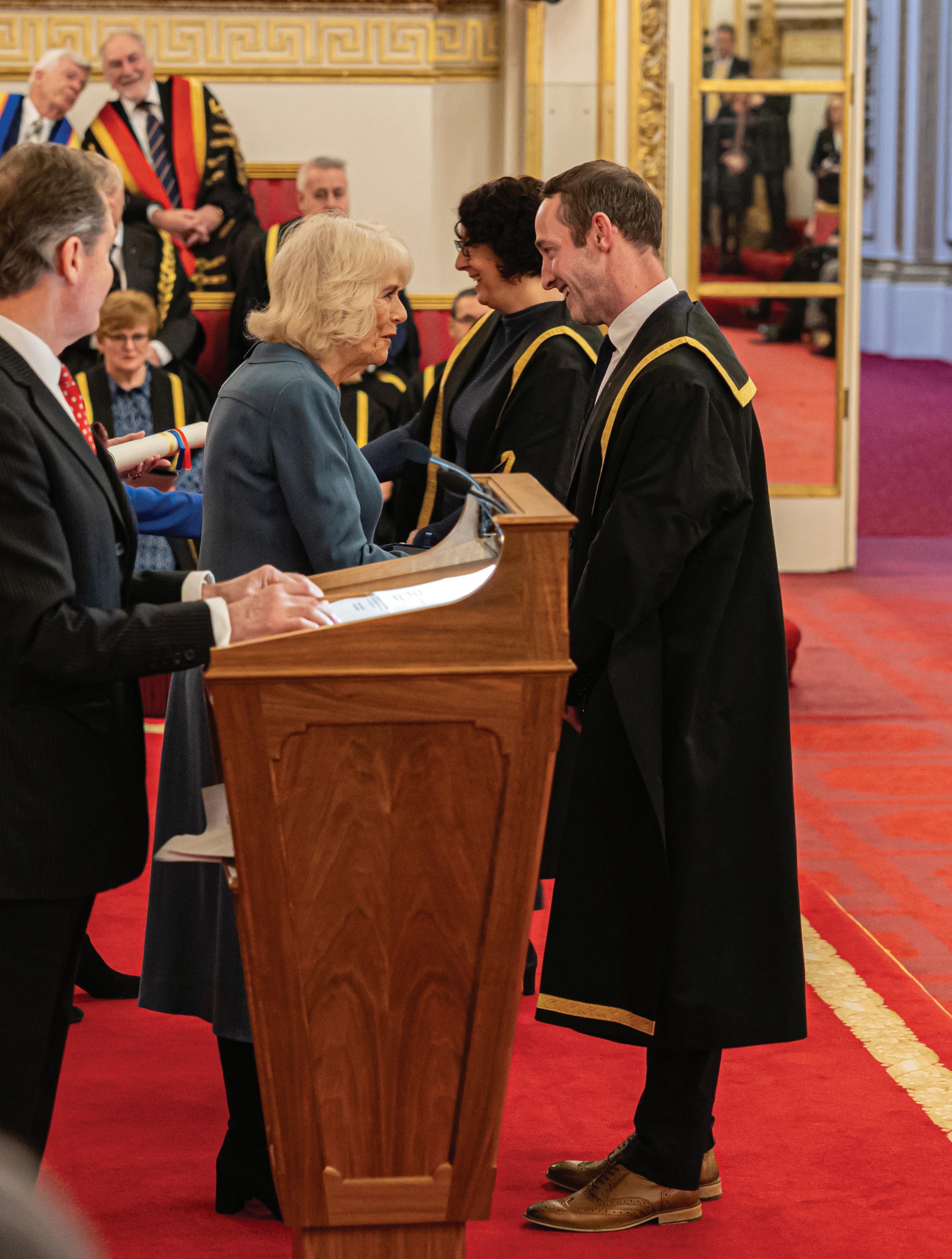

I am very proud to say that on so many levels, 2023/24 has been an incredibly successful year for the college, with a number of notable achievements and awards coupled with our continued growth, all reflecting the culmination of work across the college over several years.
After seeing a slight reduction in our funded 16-18 learner numbers in the previous year, it was pleasing to start the year with growth in what is our core marketplace, exceeding our funded allocation by 7%. With demographic growth only just starting to increase in the Southeast and averaging just over 2% across our catchment areas, this demonstrated an increase in our market share and particularly for our core land based subject areas. Given the college’s investment in subjects such as horticulture and agriculture, it has been particularly pleasing to see the growth trajectory in what are strategic priorities for the college as we respond to national and regional skills gaps. Our student applicant trends continue to show that we are attracting more students than ever to study the range of subjects on offer but in many respects, we remain the difficult choice, with our location in particular providing a barrier to those who wish to study here. We continue to do all we can to enhance accessibility and have recently re-tendered our extensive bus network and introduced new bursaries to provide even more financial support for our students.
We also continue to deliver more work with employers than ever before through LandPro and our apprenticeship provision. New apprenticeship starts exceeded 200 for the year and at one point, we had over 500 apprentices in learning with us.
Elsewhere, it was a more challenging year in terms of adult student numbers. Higher Education saw a very low intake at Level 4, somewhat reflecting a declining national picture but more so the staff changes in some subject areas as well as our central team. This had already been addressed for the start of the year, and alongside the development of a suite of new programmes with our new partner, University of Greenwich, we are expecting to see significant growth going into 24/25.
Adult numbers onto part time courses declined slightly for the year, albeit more adults took advantage of co-funding opportunities and the national Skills for Jobs initiative, where we have very successfully run courses in horticulture and environment for those without prior L3 attainment. The increase in eligibility for co-funding led to us falling short of our adult fee income target whilst we continue to maximise our adult funding allocation from government, which is restricting what we can offer to a marketplace that needs the opportunities to retrain and upskill. We continue to work with the Department for Education to make the case for increased adult funding allocations, to enable us to meet these needs in the future.
“We also continue to deliver more work with employers than ever before through LandPro and our Apprenticeship provision.”
With our embedded ethos of continued improvement, we went into the academic year with an ever-enhanced focus on student attendance, support, access to wider enrichment and personal development, and as always, ensuring our curriculum intent is aligned to the needs of the industries we support.
As a result of this, we saw some provision with excellent attendance rates but disappointingly our overall college attendance rate for 16–18-year-olds still fell below our high expectations. This does reflect the fact that school attendance has been a growing issue nationally since the pandemic and is worse in East Sussex than the national average. It is pleasing that so many of our students attend college at a rate significantly higher than they did in school but there remains more work for us to do to drive these rates up given their inevitable impact on student achievement.
Reflecting our attendance position therefore, our 16–18-year-old student achievement also fell below our high expectations, albeit was still 2% above the national average. The attendance and achievement rates of our young people represents the single greatest priority for the year ahead and is as much about building on our strength of community, sense of belonging and creating those unmissable experiences, as it is the early identification of need and appropriate intervention, including working with parents.
Our High Needs learners continued to achieve at a higher rate than their peers and over 10% higher than the national rate. Equally, for the breadth of adult provision across the college (>2,500 students), we sustained sector leading achievement rates of 90%.
As pleasing has been the continued improvements we have made with apprenticeship rates, ending the year >75% overall, which is at least 15% higher than the national rate and likely to put us in the top 10 apprenticeship providers nationally.
The achievements of our students and all those factors which contribute were recognised during our Ofsted FE and Skills inspection which took place in March. Our provision for learners with High Needs, apprenticeships and adult education all deservedly achieved outstanding grades. The quality of education at the college in terms of our teaching and learning was widely applauded by Ofsted and reflected that continued focus on pedagogy across the college in our development of dual professional staff.
Our personal development provision also received an outstanding grade, which was again particularly deserving given what has been an area of priority and concerted focus since the pandemic. This relates to not only our taught personal development curriculum, enabling students to learn and develop critical life skills such as resilience and respect, but also in the wide-ranging opportunities we provide them to expand their cultural capital. This included a diverse enrichment programme at college and an everincreasing range of trips and study tours across the UK and internationally.
Ofsted also rightly recognised the strength of relationships that the college has with its employers and stakeholders at a local, regional and national level and the many ways these benefit our students, the community and the economy. All our education provision is informed through regular engagement, ensuring students are equipped with the knowledge, skills and behaviours that employers need and there can be no better measure of the impact this has than the destination rates of our students. 92% of students who finished college in the summer of 2023 progressed into higher level study or into work in an area related to their study, a figure we believe to be unrivalled in our sector and further demonstrating the success we are having in meeting what is a national skills gap.
Our sector leading work with employers was also recognised during the year in our achievement of two national awards. The first of these was our achievement of the highly prestigious Queen’s Award, recognising our impact on the growth and success of the English wine industry. It was a privilege to attend Buckingham Palace with a group of staff and students to receive the award which is only given to a handful of HE and FE providers every two years.
Following that and for a second year in a row, we were winners at the national apprenticeship awards, this time winning Land based Provider of the Year, reflecting the fivefold growth we have seen in apprenticeship numbers in recent years, the sector leading achievement rates and the partnerships with employers that underpin this.
Our work with stakeholders and employers continues to see us adapt and develop training programmes from short courses to new apprenticeships and in the development of new degree programmes, often co-created with the employers themselves. Working closely with our neighbouring colleges and as part of FE Sussex, we have continued to use the Local Skills Improvement Plan to inform the development of these new courses whilst also attracting investment into new teaching and learning technologies, such as our immersive classroom, which will be used across our provision next academic year.
Our capital Institute of Technology project has progressed well and remains on track to complete early in 2025. This has seen developments to our winery and the building of a large extension to our Vet Nursing provision, culminating in a new Veterinary Sciences and Therapies Centre. Aligned to both will be further curriculum development as we seek to address the ever-changing skills needs of both industries and capitalise on our market leading status for each.
Our AgriFood Centre, opened in the spring of 2023, has been hugely successful in its first year, not only in providing an invaluable teaching and development space internally, but also in its capacity to be able to host large industry events. Last year saw us host our second South East Future of Farming event, as well as a regional Horticulture industry event and a national Viticulture conference.
Our large capital investment programmes over the past five years have seen us spend more than £25m on resources and facilities for students and we are already seeing the positive impact in terms of our profile within industry and through attracting more students. The national reclassification of colleges at the time of these investments have impacted aspects of our financial health and it was disappointing to end the year in a deficit position, also impacted heavily by the inflationary environment nationally. Regaining our financial resilience is a critical area of focus for the year ahead.
So much of our work in recent years on attracting, supporting, developing and enabling our staff body means we continue to maintain a very settled, stable and high performing staff team, often bucking national and regional trends for attraction, retention and sickness rates. We continue to take every opportunity to listen, engage, empower and provide development opportunities for our staff. An excellent example of this saw us launch our Future Leaders programme last year, alongside which we have started our Plumpton School of Coaching, all designed to embed that culture in which people continue to grow and flourish and ultimately from which our students are the greatest beneficiaries.
Credit must go to our governing body, whose role and impact was rightly recognised by Ofsted. They are heavily engaged in college life but more importantly provide a level of scrutiny and challenge in terms of both strategy and operational performance that only adds value and contributes to our success and continuous improvement as an organisation.
As we approach the mid-point of our current strategic plan, I am confident that we have made great strides to achieving our ambitious vision. With a new government and much change ahead of us, we are also very well placed to continue to take advantage of the opportunities that will arise, whilst also retaining that unerring focus on the experience and achievements of our students.
Plumpton College is committed to ensuring equality of opportunity for all who learn and work here. The College respects and values positively differences in race, gender, sexual orientation, ability, class and age. The College strives vigorously to remove conditions which place people at a disadvantage and we will actively combat bigotry. This policy will be resourced, implemented and monitored on a planned basis. The College’s Equal Opportunities Policy, including its Race Relations and Transgender Policies, is published on the College’s Internet site. The College considers all applications from disabled persons, bearing in mind the aptitudes of the individuals concerned. Where an existing employee becomes disabled, every effort is made to ensure that employment with the College continues. The College’s policy is to provide training, career development and opportunities for promotion, which are, as far as possible, identical to those for other employees. The College seeks to achieve the objectives set down in the Disability Discrimination Act 1995 as amended by the Special Education Needs and Disability Acts 2001 and 2005. Further details are available on the College website.
The College seeks to achieve the objectives set down in the Equality Act 2010:
a) As part of its accommodation strategy the College updated its access audit. Experts in this field conducted a full access audit during 2008/09, and the results of this formed the basis of funding capital projects aimed at improving access.
b) The College has appointed a Student Support Co-ordinator, who works with staff from across the organisation to ensure that appropriate and timely support is provided where necessary. The College also now has a specialist Learning Support team, overseen by a Learning Support Manager who liaises with students, parents, Local Authorities and external organisations to ensure that specialist learning needs of students are met.
c) There is a list of specialist equipment, such as radio aids, which the College can make available for use by students and a range of assistive technology is available in the learning centre.
d) The College has a policy in place regarding the admission of students. Appeals against a decision not to offer a place are dealt with under the complaints policy.
e) The College has made a significant investment in the appointment of specialist lecturers to support students with learning difficulties and/or disabilities. There are a number of student support assistants who can provide a variety of support for learning. There is a continuing programme of staff development to ensure the provision of a high level of appropriate support for students who have learning difficulties and/or disabilities.
f) Specialist programmes are described in College prospectuses, and achievements and destinations are recorded and published in the standard College format.
g) Counselling and welfare services are described in the College Student Handbook, which provides details of a number of services accessible to students, as well as the College’s expectations regarding behaviour and conduct, and the Complaints and Disciplinary Procedure.
“We continue to maintain a very settled, stable and high performing staff team, often bucking the national and regional trends for attraction, retention and sickness rates.”
Risk management is integral to planning and control across the College and is firmly embedded into the planning/control and decision-making process. Responsibility for identifying, assessing and managing risks is devolved to those responsible for delivering the relevant aims and objectives. Specific mitigating actions initiated or intensified in response to a new or growing risk are planned and controlled in the same way as any other action designed to deliver the business objective, not as part of a standalone Risk Management Action Plan. Corporation reviews the strategic risk register every 2 months and the risk policy every 2 years. In addition, papers including the Principal’s report, Management accounts and project updates include dedicated sections reporting risk.
Income: The College has reliance on continued government funding through the further and higher education sector funding body grants. There can be no assurance that government policy or practice will remain the same or that public funding will continue at the same levels or on the same terms. The development of diversified income streams keeps the Colleges reliance on government funding low by sector standards.
Financial health: The main challenges to the financial position has been the continued under funding of the further education sectors. This risk is mitigated through an annual budget setting process that covers a multi-year period with sensitivity analysis, quarterly detailed review of financial performance, monthly reporting of financial performance and strong financial controls,
Maintain adequate funding of pension liabilities: The financial statements report the share of the Local Government Pension Scheme is in surplus in the actuarial report but is reported as nil on the balance sheet in line with the requirements of FRS 102. This follows several years of a deficit on the College’s balance sheet with the possibility of a swing back to deficit in the years ahead. This risk is mitigated by an agreed deficit recovery plan with the East Sussex Pension Scheme.
Capital strategy: The College continues to work towards its site master plan, with more than £20m investment in the College estate in recent years. Following the ONS reclassification there is increased uncertainty of future grant and loan funding for the capital strategy that is key to meeting the needs of students and industry in addressing the regional skills gaps.
Student transport: Given the Colleges rural location, the limited availability of transport operators and the rising cost of travel is a significant challenge when two thirds of Further Education students rely on the College bus network.
The College Group has an adjusted operating deficit of £480k before FRS102 pension charges to staff costs (2023: surplus £77k). For purposes of providing greater clarity a notation is provided to the Statement of Comprehensive Income reporting unadjusted and adjusted operating surplus/deficit.
Total income for 2024 rose by 1.9% to £23,863k (2023: £23,429k). The College continued to develop its diversified income streams with growth in student numbers, demand from businesses and commercial income from Student Services, Plumpton Estate and One Garden Brighton. Funding body grants (including Local Authority high needs funding and release of deferred capital grants) are the largest source of income at £13,386k (2023: £12,570k) and as a proportion of total income at 56.1% (2022: 53.7%).
Total expenditure for 2024 rose by 2.0% to £24,303k (2023: £23,818k) inclusive of FRS102 pension liability. The growth in expenditure is in line with the growth in income, despite a high inflationary environment. The College continued to invest to improve its educational infrastructure. Capital additions were £3,520k (2023: £6,062k). This included the Agrifood project with investments in the College farm and campus. Total borrowing was £6,447k (2023: £6,600k). This represents a level of borrowing as a proportion of income of 27% (2022: 28%) which is comfortably below the Association of Colleges guidance of 40% of income.
The College inherited assets from the Local Authority following the 1992 Further and Higher Education Act and subsequently revalued some assets on adoption of FRS102. All non-land assets have been fully depreciated in the accounts. Land revaluation of £2,516k is nondepreciable and held in the revaluation reserve. All fixed assets are owned by the College and are accessed as required by the Group under a facilities agreement.
The College is a member of the East Sussex Local Government Pension scheme and its share of the assets of the fund is approximately 0.44%. The balance sheet includes a provision for defined benefit obligations that relate to this local government pension scheme. The triannual valuation at 31 March 2022 was updated to 31 July 2024 and has seen the fund move to surplus but is recognised at nil value in the balance sheet (2023: nil) as governors do not deem there will be a material reduction in contributions or a refund. As the pension provision is excluded from the EFA assessment of financial health and from the bank covenants, this movement has no material impact on the College financial health in the short or medium term.
The Corporation has reviewed its reserves policy in the light of Charity Commission guidance (CC19), the business risks and opportunities that it sees over the next 5 years. On an annual basis the College will set out the specific actions required to meet its reserves target. In the short-term the College needs cash, or access to cash, to meet; normal fluctuations in our working capital during the year, these arise principally due to the timing of our main FE Grant-In-Aid income, and varies between months; uncertainty about the level and timing of other grant streams and non-grant income; risk of additional unbudgeted costs e.g. to meet unforeseen regulatory requirements or restructuring; sector wide difficulties in securing, or retaining, access to loan and working capital facilities.
The Corporation has accordingly set a Liquidity Target of cash totalling £1.2m, broadly equivalent to one month’s staff costs. In the longer-term the College needs greater cash reserves to; repay existing longterm loans as they fall due; contribute to the fixed and working capital costs of developing new business and major projects; cover any restructuring costs associated with changes in demand; meet any longterm costs of crystallising liabilities, e.g. pensions.
The College held cash and cash equivalents at the end of year of £561k (2023: £561k). The College continues to generate strong operating cashflows with modelling showing the cash balance increasing in the years ahead to achieve the reserves target.
Treasury management is the management of the College cash flows, its banking, money market and capital market transactions; the effective control of the risks associated with those activities; and the pursuit of optimum performance consistent with those risks.
The College is committed to the terms of the Prompt Payment Code, with a target of paying all invoices within 30 days of receipt and 95% within 60 days of the invoice date, excluding disputes.
The College has continued to adopt the going concern basis in preparing the financial statement and believes it will continue in operation and meet its obligations for at least a period of 12 months. The College continues to generate operating cashflows, developing well-diversified income streams whilst investing in developments at the Plumpton and Stanmer sites.
The members who held office at the date of approval of this report confirm that, so far as they are each aware, there is no relevant audit information of which the College auditors are unaware; and each member has taken all the steps that he or she ought to have taken to be aware of any relevant audit information and to establish that the College auditors are aware of that information.
Approved by order of the members of Corporation on 17 December 2024 and signed on its behalf by:
J Dougill Chair of Governors

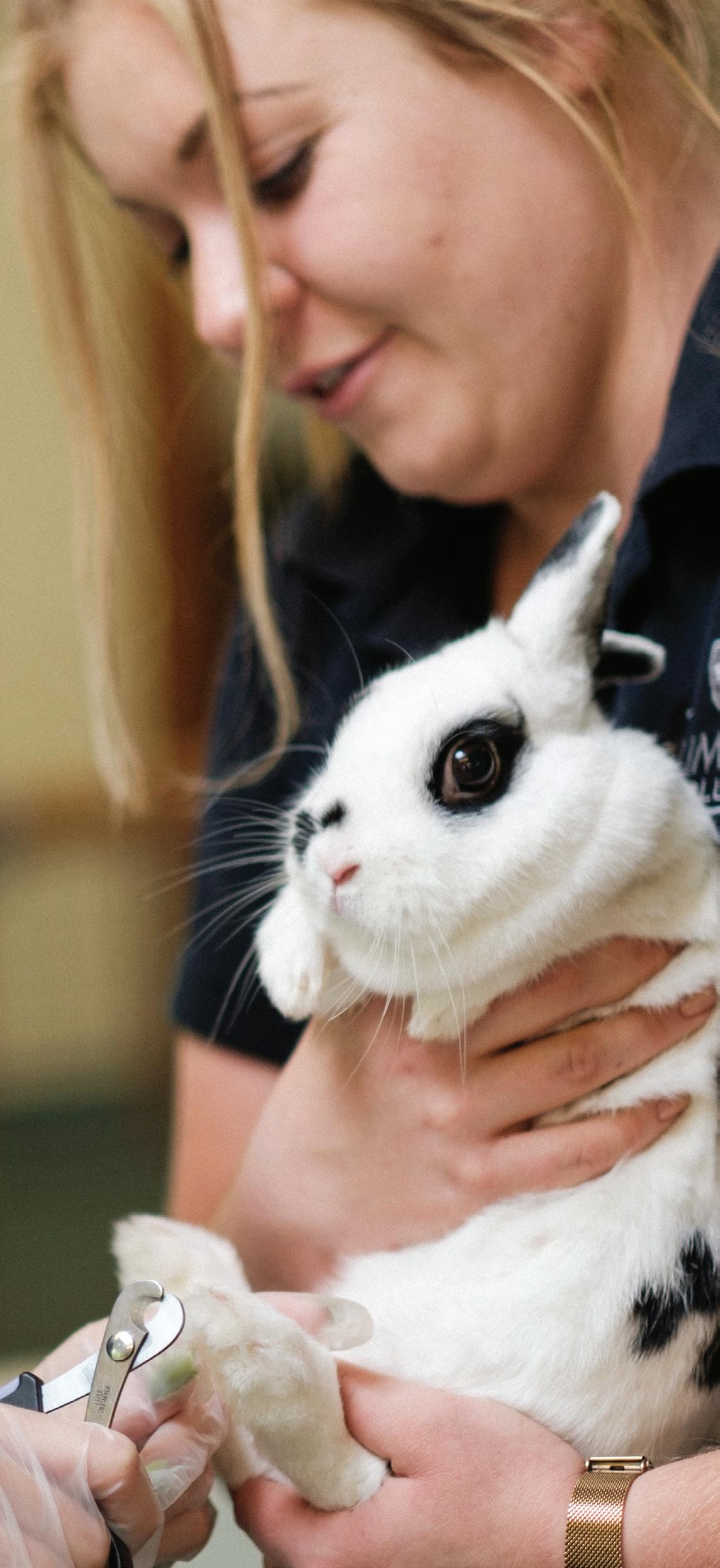

The following statement is provided to enable readers of the annual report and accounts of the College to obtain a better understanding of its governance and legal structure. This statement covers the period from 1st August 2023 to 31st July 2024 and up to the date of approval of the annual report and financial statements.
The College endeavours to conduct its business:
1. in accordance with the seven principles identified by the Committee on Standards in Public Life (selflessness, integrity, objectivity, accountability, openness, honesty and leadership);
2. in full accordance with the guidance to colleges from the Association of Colleges in The Code of Good Governance for English Colleges (“the Code”)
In the opinion of the Governors, the College complies with all the provisions of the Code, and it has complied throughout the year ended 31 July 2024, with the exception of the maximum term of office for Governors. An explanation of the reasons for the maximum term of office being exceeded by one governor can be found on page 18. This opinion is based on an internal review of compliance with the Code reported to Search and Governance Committee on the board on 11th September 2024. The Governing Body recognises that, as a body entrusted with both public and private funds, it has a particular duty to observe the highest standards of corporate governance at all times. In carrying out its responsibilities, it takes full account of The Code of Good Governance for English Colleges issued by the Association of Colleges in 2023, which it formally adopted on 27th February 2024.
The corporation was established under the Further and Higher Education Act 1992 for the purpose of conducting Plumpton College. The college has one wholly owned subsidiary ‘One Garden Brighton Ltd’. Plumpton College is an exempt charity under the Part 3 of the Charities Act 2011 and is regulated by the Secretary of State for Education. The members of the Governing Board, who are trustees of the charity, are disclosed on pages 15-16. In setting and reviewing the college’s strategic objectives, the Governing Board has had due regard for the Charity Commission’s guidance on public benefit and particularly upon its supplementary guidance on the advancement of education.
In delivering its mission, the College provides identifiable public benefits through the advancement of education including students with high needs. The college adjusts its courses to meet the needs of local employers and provides training to apprentices. The college is committed to providing information, advice and guidance to the students it enrols and to finding suitable courses for as many students as possible regardless of their educational background.
The public benefits delivered are described in the Strategic Report on pages 5-13.
The members who served on the Corporation during the year and up to the date of signature of this report were as listed in the table below. Chair and Vice Chair are appointed annually.
Name Background
Julie Dougill (Chair of Governors)
In addition the Corporation has co-opted the following non-members to sit on its Committees/Corporation (see above). The Corporation is grateful for the expertise and insights these co-optees brought to the work of its Committees during the year.
John Moore-Bick left the Corporation during the year at the end of his second term of office. Corporation would like to thank him for his outstanding contribution to the college. Sarah George left the Corporation at the end of her term of Office. Corporation would like to thank her for bringing the valued staff perspective to meetings. Corporation would also like to thank Mark Filsell for his valued contribution as Co-opted Member of Audit Committee.
It is the Corporation’s responsibility to set and regularly review the College’s mission and strategic objectives, to agree the framework for managing risk, and to articulate the Corporation’s risk appetite. Governors bring independent judgement to bear on performance, resources and standards of conduct. The Corporation is provided with regular and timely
information on the overall financial performance of the College together with other information such as performance against funding targets, proposed capital expenditure, quality matters and personnelrelated matters such as health and safety and environmental issues. The Corporation meets eight times per year and may reach decisions between meetings by correspondence.
The Corporation also conducts business through a small number of committees. Each committee has terms of reference, which have been approved by the Corporation; these are available on the College’s website. These committees are Audit, Finance, TAFG (Task and Finish Group) Academic, Remuneration and Search and Governance. Full minutes of all meetings, except those deemed to be confidential by the Corporation, are available from the Clerk to the Corporation at the College’s registered address.
In addition to its formal committees, the Corporation has linked each external governor to one or more business or business support areas, involving regular meetings with both the senior and middle management in each area. This helps Governors to take the pulse of the College and improves the depth of Corporation discussion; it also makes the specialist expertise and insights of governors more accessible to managers.
The Clerk to the Corporation maintains a register of financial and personal interests of the governors. The register is available for inspection at the above address. All governors are able to take independent professional advice in furtherance of their duties at the College’s expense and have access to the Clerk to the Corporation, who is responsible to the Board for ensuring that all applicable procedures and regulations are complied with. The appointment, evaluation and removal of the Clerk are matters for the Corporation as a whole.
Formal agendas, papers and reports are supplied to governors in a timely manner, prior to Board meetings. Briefings are provided on an ad hoc basis.
The Corporation has a strong and independent nonexecutive element and no individual or group dominates its decision-making process. The Corporation considers that each of its non-executive members is independent of management and free from any business or other relationship which could materially interfere with the exercise of their independent judgement. There is a clear division of responsibility in that the roles of the Chair and Accounting Officer are separate; the Chair’s role has been defined in writing.
Any new appointments to the Corporation are a matter for the consideration of the Corporation as a whole. The Corporation has a Search and Governance committee, consisting of six members of the Corporation, which is responsible for the selection and nomination of any new member for the Corporation’s consideration. Members of the corporation are appointed for a term of office not exceeding four years. The Search and Governance Committee is guided by an analysis of the skills the Corporation requires and by the aim of ensuring an appropriate diversity of experience, age, and gender on the Governing Board.
The Corporation is responsible for ensuring that appropriate training is provided as required. All new Governors receive induction training. As regards subsequent governor development, most Corporation meetings are preceded by an in-depth briefing on new College initiatives or external developments such as new regulations or Government policies. Governor training in 2023/24 included Safeguarding,14-16 Provision, SEND reforms, Student Development and One Garden Brighton. Governors are also encouraged to attend external courses. Governors attended the AoC Conference, AoC Finance and Audit Committee Chairs, AoC webinars on the Local skills agenda ETF online training ‘Understanding sector policy and inspection’ and ‘Effective Teaching, Learning and Assessment. The Clerk to the Corporation attended the AoC Governance Professional Conference and attended a number of webinars hosted by AoC/ ETF, Good Governance Institute and RSM topics covered included the local skills agenda, funding and finance, EDI, AI in governance and the new Finance Handbook.

Members of the Corporation are appointed for a term of office not exceeding four years. Under the Code of Good Governance for English Colleges, governors should not normally serve more than two terms. One external governor in 2023/24 had served more than two terms. Corporation believes that reappointment beyond two terms calls for explicit justification, and should normally be limited to further terms of only one or two years duration. The performance of individual governors is taken into account in considering re-appointments, and is particularly searching on a second or subsequent re-appointment. In December 2022, on the recommendation of the Search and Governance Committee, we re-appointed Julie Dougill for a third 4-year term of office. Julie has 100% attendance record for meetings and has made a significant governor contribution. In reaching a decision to re-appoint, consideration was given to the skills required by the board, continuity of leadership at the launch of a new strategy (Julie has served as Chair for only two years (much of which has been atypical due to Covid)) and succession planning for a new Chair including a hand over period.
The corporation carried out a self-assessment of its own performance for the year ended 31 July 2024 and graded itself as “Good” on the Ofsted scale. The selfassessment was informed by individual governor input via a survey, governor one to one meetings with Chair or Vice Chair, Senior Management Team feedback, Chair’s appraisal, College Management Team evaluation of the Link Governor scheme, assessment
against the code of governance, and committee selfassessments. In response to the governance selfassessment a governance quality improvement plan is implemented. The governing body has considered DfE guidance on board reviews and has plans to commission an external review in the academic year 24/25 but did not carry out a formal review in 2023-4.
Throughout the year ending 31 July 2024 the College’s Remuneration Committee comprised four members of the Corporation. The Committee’s responsibilities are to make recommendations to the Board on the remuneration and benefits of the Principal and Clerk. The Committee evaluate the specific remuneration packages of the Principal against:
• Recent performance (summary to be provided by the Chair as line manager, who is responsible for completing appraisals and setting targets for the Principal)
• Benchmarking data, including the AoC Senior Post Holders pay survey
• The college’s approach to rewarding all of its staff, and in particular, consideration is given annually to the rate of increase of the average remuneration of all other staff.
Remuneration of other managers and staff is the responsibility of the Principal. In determining pay of Senior Staff the Principal will consider recent performance (using the college appraisal system), market rate and the rate of increase of the average
remuneration of all other staff. All staff must request permission from the Principal if they intend to take on external work. The Clerk maintains a Register of Senior Staff’s Interests and Senior Staff are requested to disclose annually all business interests. Corporation formally adopted the AoC Senior Staff Remuneration Code on 26th February 2019 and has due regard to” the “Higher Education Senior Staff Remuneration Code” published by the Committee of University Chairs. Details of remuneration for the Year Ended 31 July 2024 are set out in note 7 to the financial statements.
The Audit Committee comprises four members of the Corporation (excluding the Accounting Officer and Chair) and two Co-opted members. The Committee operates in accordance with written terms of reference approved by the Corporation.
The Audit Committee’s core task is to oversee the work of the external auditors (the ‘financial statements auditors’) in accordance with the Post 16 Audit Code of Practice prescribed by the ESFA, but also to oversee the College’s other audit and assurance work and to monitor implementation of the recommendations for improved controls that flow from this.
The Audit Committee advises the Corporation on the appointment of internal and external auditors, and their remuneration. It prioritises the internal audit programme and oversees implementation of agreed recommendations. It shapes the scope of the external audit and the management letter that flows
from it. The Committee focuses not only on finance but also looks for wider assurance on internal controls, quality monitoring and management information systems. The Committee prepares an annual report to the Corporation on the robustness of the internal control system and on possible areas for improvement. Following a tender process, Forvis Mazars were appointed in May 2023 on a one-year plus one-year contract. ICCA (Internal Auditors) completed two internal audits in the year; Work placement Audit and HE/OfS Compliance. Further audit and assurance work were completed by other specialists e.g. JISC and Landex.
The audit committee met four times in the year to 31 July 2024. The members of the committee and their attendance records are shown below:
The Corporation is ultimately responsible for the College’s system of internal control and for reviewing its effectiveness. However, such a system is designed to manage rather than eliminate the risk of failure to achieve business objectives, and can provide only reasonable and not absolute assurance against material misstatement or loss.
The Corporation has delegated the day-to-day responsibility to the Principal, as Accounting Officer, for maintaining a sound system of internal control that supports the achievement of the College’s policies, aims and objectives, whilst safeguarding the public funds and assets for which he is personally responsible, in accordance with the responsibilities assigned to him in the Funding Agreement between Plumpton College and the funding bodies. He is also responsible for reporting to the Corporation any material weaknesses or breakdowns in internal control.
The system of internal control is based on an ongoing process designed to identify and prioritise the risks to the achievement of College policies, aims and objectives, to evaluate the likelihood of those risks being realised and the impact should they be realised, and to manage them efficiently, effectively and economically. The system of internal control has been in place in Plumpton College for the Year Ended 31 July 2024 and up to the date of approval of the annual report and accounts.
The Corporation has reviewed the key risks to which the College is exposed together with the operating, financial and compliance controls that have been implemented to mitigate those risks. The Corporation is of the view that there is a formal ongoing process for identifying, evaluating and managing the College’s significant risks that has been in place for the period ending 31 July 2024 and up to the date of approval of the annual report and accounts. This process is regularly reviewed by the Corporation.
The system of internal control is based on a framework of regular management information, administrative procedures including the segregation of duties, a system of delegation and accountability, and a risk based approach (including an evaluation of the likelihood and impact of risks becoming reality). In particular, it includes:
• long-term strategic objectives through to 2027 agreed by the Corporation and supported by a suite of key performance measures
• comprehensive budgeting systems with an annual budget, which is reviewed and agreed by the governing Board
• regular reviews by the governing board of periodic and annual financial reports which indicate financial performance against forecasts
• setting targets to measure financial and other performance
• the adoption of formal project management disciplines, where appropriate.
The College’s internal and external auditors operate in accordance with the ESFA’s Post 16 Audit Code of Practice. Their work is informed by an analysis of the risks to which the college is exposed.
Control weaknesses identified
No significant concerns on internal controls were raised during the course of the 2024 external audit by Forvis Mazars.
Key risks are covered within the strategic report. Risk assessment and internal control are embedded on ongoing operations. Corporation regularly reviews the risk register, which covers business, operational and compliance risk as well as financial risk and the risk policy every two years. In addition, papers including the Principal’s report, Management Accounts and project updates include dedicated sections reporting risk.
The Department for Education and Education and Skills Funding Agency introduced new controls for the college on 29 November 2022 on the day that the Office for National Statistics reclassified colleges as public sector organisations in the national accounts. The ESFA chief executive communicated these changes to all college accounting officers and introduced a college financial handbook in 2024. The college has reviewed its policies,
procedures and approval processes in line with these new requirements to ensure there are systems in place to identify and handle any transactions for which DfE approval is required.
The audit committee has advised the board of governors that the Corporation has an effective framework for governance and risk management in place. The audit committee believes the Corporation has effective internal controls in place.
The specific areas of work undertaken by the audit committee in 2023/24 and up to the date of the approval of the financial statements are:
• monitored, and tracked the follow-up of external assurance work conducted by regulatory/funding bodies and by the internal auditors, together with internal assurance reviews conducted by management; this assurance work covered not only financial controls but also controls over academic quality, safeguarding and the residential provision.
• agreed a prioritised internal audit work programme based on the 3-year outline programme agreed last year, but updated for evolving judgements on key areas of risk.
• carried out ad hoc reviews of financial aspects of the college, including policies and issues referred to it by the Corporation for detailed consideration.
As Accounting Officer, the Principal has responsibility for reviewing the effectiveness of the system of internal control. His review of the effectiveness of the system of internal control is informed by:
• The work of internal auditors
• the work of the Finance Director and other executive managers at the College with responsibility for development and maintenance of the internal control framework;
• upward reports from departments setting out current performance against key performance indicators and prospective risks;
• comments made by the College’s financial statements auditors, the reporting accountant for regularity assurance, in their management letters and other reports
• the programme of external assurance and audit agreed with the Audit Committee.
The Senior Management Team receives reports setting out key performance and risk indicators and considers possible control issues brought to their attention by early warning mechanisms, which are embedded within the departments and reinforced by risk awareness training. SMT and Audit Committee have a programme of audit and assurance work, both internal and external, and framed by reference to risk, which they regularly review and roll forward. The reports include recommendations for improvement, and SMT and Audit Committee monitor their implementation. The Audit Committee’s role in this area is confined to a high-level review of the arrangements for internal control. The Corporation’s agenda includes a regular item for consideration of risk and control and receives reports thereon from the senior management team and the Audit Committee. The emphasis is on obtaining the relevant degree of assurance and not merely reporting by exception.
Based on the advice of the Audit Committee and the Accounting Officer, the Corporation is of the opinion that the College has an adequate and effective framework for governance, risk management and control, and has fulfilled its statutory responsibility for “the effective and efficient use of resources, the solvency of the institution and the board and the safeguarding of their assets”.
Key management personnel
Key management personnel are defined as members of the College Senior Management Team and were represented by the following in 2023/24:
J Kerswell Principal; Accounting officer
C Knell Finance Director (to May 24)
J Hibbert Deputy Principal
P Tanghe Vice Principal
J Buckley Vice Principal
S Jeffers HR Director
P Cook Finance Director (from June 24)
Professional advisers
Financial statements auditors and reporting accountants
Forvis Mazars LLP Park View House, 58 The Ropewalk, Nottingham, NG1 5DW
Internal Auditors ICCA Education, Training and Skills Limited
Registered Office: 11th floor, McClaren House, 46 Priory Queensway, Birmingham, B4 7LR
Bankers Clydesdale Bank plc (Virgin Money) 170 North Street, Brighton, BN11EA
Solicitors Brachers Head Office, Somerfield House, 59 London Road, Maidstone, Kent, ME16 8JH
Approved by order of the members of the Corporation on 17 December 2024 and signed on its behalf by:

J Kerswell Accounting Officer

J Dougill Chair of Governors
As accounting officer I confirm that the corporation has had due regard to the framework of authorities governing regularity, priority and compliance, and the requirements of the college’s accountability agreement, funding agreements and contracts with ESFA and DfE, and has considered its responsibility to notify ESFA of material irregularity, impropriety and non-compliance with those authorities and terms and conditions of funding.
I confirm on behalf of the corporation that after due enquiry, and to the best of my knowledge, I am able to identify any material irregular or improper use of funds by the corporation, or material non-compliance with the framework of authorities and the terms and conditions of funding under the college’s accountability agreement, funding agreements and contracts with ESFA and DfE, or any other public funder. This includes the elements outlined in the “Dear accounting officer” letter of 29 November 2022 and ESFA’s bite size guides.
I confirm that no instances of material irregularity, impropriety, funding noncompliance, or non-compliance with the framework of authorities have been discovered to date. If any instances are identified after the date of this statement, these will be notified to ESFA.
J Kerswell Accounting officer
17 December 2024
On behalf of the corporation, I confirm that the accounting officer has discussed their statement of regularity, propriety and compliance with the board and that I am content that it is materially accurate.
J Dougill Chair of governors
17 December 2024

To: The corporation of Plumpton College and Secretary of State for Education, acting through Education and Skills Funding Agency (ESFA)
In accordance with the terms of our engagement letter dated June 2024 and further to the requirements and conditions of funding in ESFA and DfE’s accountability agreements, grant funding agreements and contracts, or those of any other public funder, we have carried out an engagement to obtain limited assurance about whether anything has come to our attention that would suggest, in all material respects, the expenditure disbursed and income received by Plumpton College during the period 1 August 2023 to 31 July 2024 have not been applied to the purposes intended by Parliament and the financial transactions do not conform to the authorities which govern them.
The framework that has been applied is set out in the Post-16 Audit Code of Practice (the Code) issued by ESFA and in any relevant conditions of funding, concerning adult education notified by a relevant funder.
This report is made solely to the corporation of Plumpton College and ESFA in accordance with the terms of our engagement letter. Our work has been undertaken so that we might state to the corporation of Plumpton College and ESFA those matters we are required to state in a report and for no other purpose. To the fullest extent permitted by law, we do not accept, or assume, responsibility to anyone other than the corporation of Plumpton College and ESFA for our work, for this report, or for the conclusion we have formed.
The corporation of Plumpton College is responsible, under the requirements of the Further & Higher Education Act 1992, subsequent legislation and related regulations and guidance, for ensuring that expenditure disbursed, and income received, are applied for the purposes intended by Parliament, and the financial transactions conform to the authorities that govern them.
Our responsibilities for this engagement are established in the United Kingdom by the Code our profession’s ethical guidance and are to obtain limited assurance and report in accordance with our engagement letter and the requirements of the Code. We report to you whether anything has come to our attention in carrying out our work, which suggests that in all material respects, expenditure disbursed and income received, during the period 1 August 2023 to 31 July 2024 have not been applied to purposes intended by Parliament or that the financial transactions do not conform to the authorities which govern them.
We conducted our engagement in accordance with the Code issued by ESFA. We performed a limited assurance engagement as defined in that framework.
The objective of a limited assurance engagement is to perform such procedures as to obtain information and explanations in order to provide us with sufficient appropriate evidence to express a negative conclusion on regularity.
A limited assurance engagement is more limited in scope than a reasonable assurance engagement and consequently does not enable us to obtain assurance that we would become aware of all significant matters that might be identified in a reasonable assurance engagement. Accordingly, we do not express a positive opinion.
Our engagement includes examination, on a test basis, of evidence relevant to the regularity and propriety of the corporation’s income and expenditure.
The work undertaken to draw to our conclusion includes:
• Reviewed the statement on the College’s regularity, propriety and compliance with Funding body terms and conditions of funding.
• Reviewed the College’s completed self-assessment questionnaire on regularity.
• Read the accountability agreements, grant funding agreements and contracts with the ESFA.
• Tested a sample of expenditure disbursed and income received to consider whether they have been applied to purposes intended by Parliament and in accordance with funding agreements where relevant.
• Tested a sample of individual learner records.
• Reviewed approved policies and procedures operating during the year for each funding stream that has specific terms attached.
• Obtained the policy for personal gifts and/or hospitality.
• Obtained the register of personal interests.
• Obtained the financial regulations/financial procedures.
• Obtained the College’s whistleblowing policy.
• Reviewed the College’s compliance with the requirements of HM Treasury’s “Managing Public Money” document.
In the course of our work, nothing has come to our attention which suggests that in all material respects, the expenditure disbursed and income received during the period 1 August 2023 to 31 July 2024 has not been applied to purposes intended by Parliament, and that the financial transactions do not conform to the authorities that govern them.
Forvis Mazars LLP
Chartered Accountants and Statutory Auditor
Park View House, 58 The Ropewalk, Nottingham NG1 5DW
Date: 17 December 2024

The members of the corporation are required to present audited financial statements for each financial year.
Within the terms and conditions of the college’s accountability agreement, funding agreements and contracts with ESFA and DfE, the corporation is required to prepare financial statements which give a true and fair view of the financial performance and position of the corporation for the relevant period. Corporations must also prepare a strategic report which includes an operating and financial review for the year. The bases for the preparation of the financial statements and strategic report are the Statement of Recommended Practice – Accounting for Further and Higher Education, ESFA’s College Accounts Direction and the UK’s Generally Accepted Accounting Practice. In preparing the financial statements, the corporation is required to:
• select suitable accounting policies and apply them consistently
• make judgements and estimates that are reasonable and prudent
• state whether applicable UK accounting standards have been followed, subject to any material departures disclosed and explained in the financial statements
• assess whether the corporation is a going concern, noting the key supporting assumptions, qualifications or mitigating actions, as appropriate (which must be consistent with other disclosures in the accounts and auditor’s report), and
• prepare financial statements on the going concern basis unless it is inappropriate to assume that the corporation will continue in operation.
The corporation is also required to prepare a strategic report, in accordance with paragraphs 3.23 to 3.27 of the FE and HE SORP, that describes what it is trying to do and how it is going about it, including information about the legal and administrative status of the corporation.
The corporation is responsible for keeping proper accounting records which disclose, with reasonable accuracy at any time, the financial position of the corporation and which enable it to ensure that the financial statements are prepared in accordance with relevant legislation including the Further and Higher Education Act 1992 and Charities Act 2011, and relevant accounting standards. It is responsible for taking steps that are reasonably open to it to safeguard its assets and to prevent and detect fraud and other irregularities.
The corporation is responsible for the maintenance and integrity of its website(s); the work carried out by auditors does not involve consideration of these matters and, accordingly, auditors accept no responsibility for any changes that may have occurred to the financial statements since they were initially presented on the website. Legislation in the United Kingdom governing the preparation and dissemination of financial statements may differ from legislation in other jurisdictions.
Members of the corporation are responsible for ensuring that expenditure and income are applied for the purposes intended and that the financial transactions conform to the authorities that govern them. In addition, they are responsible for ensuring that funds from ESFA, DfE, and any other public funds, are used only in accordance with the accountability agreement, funding agreements and contracts and any other conditions, that may be prescribed from time to time by ESFA, or any other public funder, including that any transactions entered into by the corporation are within the delegated authorities set out in the “Dear accounting officer” letter of 29 November 2022 and ESFA’s bite size guides. Members of the corporation must ensure that there are appropriate financial and management controls in place to safeguard public and other funds and ensure they are used properly. In addition, members of the corporation are responsible for securing economic, efficient and effective management of the corporation’s resources and expenditure so that the benefits that should be derived from the application of public funds from ESFA, DfE and other public bodies are not put at risk.
Approved by order of the members of the corporation on 3rd December 2024 and signed on its behalf by:
J Dougill Chair of Governor
We have audited the financial statements of Plumpton College (the ‘College’) and its subsidiary (collectively the ‘Group’) for the year ended 31 July 2024 which comprise the Statement of Comprehensive Income and Expenditure, the Statement of Changes in Reserves, the Balance Sheet, the Statement of Cashflows and notes to the financial statements, including a summary of significant accounting policies. The financial reporting framework that has been applied in their preparation is applicable law and United Kingdom Accounting Standards, including FRS 102 “The Financial Reporting Standard applicable in the UK and Republic of Ireland” (United Kingdom Generally Accepted Accounting Practice) and the 2019 Statement of Recommended Practice: Accounting for Further and Higher Education.
In our opinion, the financial statements:
• give a true and fair view of the state of the College’s affairs as at 31 July 2024 and of its deficit of income over expenditure for the year then ended;
• have been properly prepared in accordance with United Kingdom Generally Accepted Accounting Practice.
We conducted our audit in accordance with International Standards on Auditing (UK) (ISAs (UK)) and applicable law. Our responsibilities under those standards are further described in the “Auditor’s responsibilities for the audit of the financial statements” section of our report. We are independent of the College in accordance with the ethical requirements that are relevant to our audit of the financial statements in the UK, including the FRC’s Ethical Standard, and we have fulfilled our other ethical responsibilities in accordance with these requirements. We believe that the audit evidence we have obtained is sufficient and appropriate to provide a basis for our opinion.
In auditing the financial statements, we have concluded that the Members of the Corporation’s use of the going concern basis of accounting in the preparation of the financial statements is appropriate.
Based on the work we have performed, we have not identified any material uncertainties relating to events or conditions that, individually or collectively, may cast significant doubt on the College’s ability to continue as a going concern for a period of at least twelve months from when the financial statements are authorised for issue.
Our responsibilities and the responsibilities of the Members of the Corporation with respect to going concern are described in the relevant sections of this report.
The other information comprises the information included in the annual report, other than the financial statements and our auditor’s report thereon. The Corporation is responsible for the other information contained within the annual report. Our opinion on the financial statements does not cover the other information and, except to the extent otherwise explicitly stated in our report, we do not express any form of assurance conclusion thereon. Our responsibility is to read the other information and, in doing so, consider whether the other information is materially inconsistent with the financial statements or our knowledge obtained in the course of the audit, or otherwise appears to be materially misstated. If we identify such material inconsistencies or apparent material misstatements, we are required to determine whether there is a material misstatement in the financial statements themselves. If, based on the work we have performed, we conclude that there is a material misstatement of this other information, we are required to report that fact.
We have nothing to report in this regard.
In light of the knowledge and understanding of the College and its environment obtained in the course of the audit, we have not identified material misstatements in the report of the Members of the Corporation and statement of corporate governance and internal control.
We have nothing to report in respect of the following matters where the Post 16 Audit Code of Practice issued by the Education and Skills Funding Agency requires us to report to you if, in our opinion:
• adequate accounting records have not been kept, or returns adequate for our audit have not been received from branches not visited by us; or
• the financial statements are not in agreement with the accounting records and returns; or
• we have not received all the information and explanations we require for our audit.
As explained more fully in the Statement of Responsibilities of the Members of the Corporation set out on page 28, the Corporation is responsible for the preparation of the financial statements and for being satisfied that they give a true and fair view, and for such internal control as the Corporation determine is necessary to enable the preparation of financial statements that are free from material misstatement, whether due to fraud or error.
In preparing the financial statements, the Corporation is responsible for assessing the College’s ability to
continue as a going concern, disclosing, as applicable, matters related to going concern and using the going concern basis of accounting unless the Corporation either intend to liquidate the College or to cease operations, or have no realistic alternative but to do so.
Our objectives are to obtain reasonable assurance about whether the financial statements as a whole are free from material misstatement, whether due to fraud or error, and to issue an auditor’s report that includes our opinion. Reasonable assurance is a high level of assurance but is not a guarantee that an audit conducted in accordance with ISAs (UK) will always detect a material misstatement when it exists. Misstatements can arise from fraud or error and are considered material if, individually or in the aggregate, they could reasonably be expected to influence the economic decisions of users taken on the basis of the financial statements.
The extent to which our procedures are capable of detecting irregularities, including fraud is detailed below.
Irregularities, including fraud, are instances of noncompliance with laws and regulations. We design procedures in line with our responsibilities, outlined above, to detect material misstatements in respect of irregularities, including fraud.
Based on our understanding of the College and its industry, we considered that non-compliance with the following laws and regulations might have a material effect on the financial statements: compliance with
the ESFA funding agreements, the OfS regulatory framework, the OFSTED regulatory framework, safeguarding, pensions legislation, employment regulation and health and safety regulation, antibribery, corruption and fraud and money laundering.
To help us identify instances of non-compliance with these laws and regulations, and in identifying and assessing the risks of material misstatement in respect to non-compliance, our procedures included, but were not limited to:
• Inquiring of management and, where appropriate, those charged with governance, as to whether the College is in compliance with laws and regulations, and discussing their policies and procedures regarding compliance with laws and regulations;
• Inspecting correspondence, if any, with relevant licensing or regulatory authorities;
• Communicating identified laws and regulations to the engagement team and remaining alert to any indications of non-compliance throughout our audit; and
• Considering the risk of acts by the College which were contrary to applicable laws and regulations, including fraud.
We also considered those laws and regulations that have a direct effect on the preparation of the financial statements, such as tax and pension legislation.
• Making enquiries of the Members of the Corporation and management on whether they had knowledge of any actual, suspected or alleged fraud;
• Gaining an understanding of the internal controls established to mitigate risks related to fraud;
• Discussing amongst the engagement team the risks of fraud; and
• Addressing the risks of fraud through management override of controls by performing journal entry testing.
There are inherent limitations in the audit procedures described above and the primary responsibility for the prevention and detection of irregularities including fraud rests with management. As with any audit, there remained a risk of non-detection of irregularities, as these may involve collusion, forgery, intentional omissions, misrepresentations or the override of internal controls.
A further description of our responsibilities for the audit of the financial statements is located on the Financial Reporting Council’s website at www.frc.org. uk/auditorsresponsibilities. This description forms part of our auditor’s report.
In addition, we evaluated the Members of the Corporation and management’s incentives and opportunities for fraudulent manipulation of the financial statements, including the risk of management override of controls, and determined that the principal risks related to: posting manual journal entries to manipulate financial performance, management bias through judgements and assumptions in significant accounting estimates, in particular in relation to the pension asset, revenue recognition (which we pinpointed to the cut off) and significant one-off or unusual transactions. Our audit procedures in relation to fraud included but were not limited to:
Other required reporting
Opinion on other matters prescribed in the OfS Audit Code of Practice issued under the Further and Higher Education Act 1992.
In our opinion, in all material respects:
• funds provided by the OfS and UK Research and Innovation (including Research England) have been applied in accordance with the relevant terms and conditions attached to them; and
• the requirements of OfS’s accounts direction have been met.
on which we are required
We have nothing to report in respect of the following matters in relation to which the OfS Audit Code of Practice requires us to report to you if, in our opinion:
• the provider’s grant and fee income, as disclosed in the notes to the financial statements, has been materially misstated; or
• the provider’s expenditure on access and participation activities, as disclosed in the financial statements, has been materially misstated.
This report is made solely to the Corporation as a body in accordance with the College’s Articles of Government. Our audit work has been undertaken so that we might state to the Corporation those matters we are required to state to them in an auditor’s report and for no other purpose. To the fullest extent permitted by law, we do not accept or assume responsibility to anyone other than the College and the Corporation as a body for our audit work, for this report, or for the opinions we have formed.
Forvis Mazars LLP Chartered Accountants and Statutory Auditor
Park View House, 58 The Ropewalk, Nottingham NG1 5DW
Date: 17 December 2024
PLUMPTON COLLEGE Statement of Comprehensive Income for the year ended 31 July
PLUMPTON COLLEGE Balance Sheet at 31 July (£’000)
The notes from page 38 to 58 form part of these financial statem ents. The financial statements were approved by Corporation on [date ] and authorised for issue and were signed on its behalf by:
J Kerswell Accounting Officer
J Dougill Chair of Governors
COLLEGE Statement of Cash Flows for the year ended 31 July (£’000) - Continued
The Corporation aims to apply accounting policies which are towards the conservative end of the FE accounting spectrum.
The following accounting policies have been applied consistently in dealing with items which are considered material in relation to the financial statements.
These financial statements have been prepared in accordance with the Statement of Recommended Practice (SORP): Accounting for Further and Higher Education 2019 (the 2019 FE HE SORP) the College Accounts Direction for 2023-24 and in accordance with Financial Reporting Standard 102 – “The Financial Reporting Standard applicable in the United Kingdom and Republic of Ireland”. (FRS102). The College is a public benefit entity and has therefore applied the relevant public benefit requirements of FRS 102. The preparation of financial statements in compliance with FRS 102 requires the use of certain critical accounting estimates. It also requires management to exercise judgement in applying the College’s accounting policies.
The financial statements are prepared under the historical cost convention.
The consolidated financial statements include the college and its subsidiary, One Garden Brighton Limited, controlled by the group. Control is achieved where the group has the power to govern the financial and operating policies of an entity so as to obtain benefits from its activities. Under the purchase method of accounting, the results of subsidiary and associated undertakings acquired or disposed of during the year are included in the consolidated income and expenditure account from or up to the date on which control of the undertaking passes. Intra-group sales and profits are eliminated fully on consolidation.
In accordance with FRS 102, the activities of the student union have not been consolidated because the college does not control those activities.
These financial statements have been prepared on the Going Concern basis. The activities of the College, together with the factors likely to affect its future development and performance are set out in the Strategic Report. The financial position of the College, its cashflow, liquidity and borrowings are presented in the Financial Statements and accompanying Notes.
The College has a SALIX loan repayable in 2025, a commercial loan repayable in 2028 and a loan from the Secretary of State for Education repayable in 2044. In addition the College has a loan agreement for which there is no liability as at 31 July 2024, drawdowns will begin in November 2024, repayable in 2045.
The College forecasts and financial projections indicate that it will be able to operate within this facilities and covenants for the foreseeable future. Accordingly, the College has a reasonable expectation that it has adequate resources to continue in operational existence for the foreseeable future, and for this reason will continue to adopt the going concern basis in the preparation of its financial statements.
Revenue Grant Funding: Government revenue grants include funding body recurrent grants and other grants are accounted for under the accrual model as permitted by FRS 102. Funding body recurrent grants are measured in line with best estimates for the period of what is receivable and depend on the particular income stream involved. Grants (including research grants) from non-government sources are recognised in income when the College is entitled to the income and performance related conditions have been met.
Capital Grant Funding: Government capital grants are capitalised, held as deferred income and recognised in income over the expected useful life of the
asset, under the accrual model as permitted by FRS 102. Other, non-governmental, capital grants are recognised in income when the College is entitled to the funds subject to any performance related conditions being met.
Deferred Grants: Where part of a grant is deferred, the deferred element is recognised as deferred income within creditors and allocated between creditors due within one year and creditors due after more than one year as appropriate.
Fee Income: Income from tuition fees is stated gross of any expenditure which is not a discount and is recognised in the period for which it is received.
Agency agreements: The College acts as an agent in the collection and payment of certain discretionary support funds and any other arrangements. Related payments received from the funding bodies and subsequent disbursements to students are excluded from the income and expenditure of the College where the College is exposed to minimal risk or enjoys minimal economic benefit related to the transaction.
Donations and legacies: Donations (except in relation to legacies) are accounted for when receivable. The level of income from legacies is not material but they are recognised where there is clear entitlement, the amount can be accurately measured and there is reasonable probability of receipt.
Investment income: All income from short term deposits is credited to the statement of comprehensive income in the period in which it is earned on a receivable basis.
Income from commercial activities: Income raised through the operation of commercial activities and related trading activities under the College’s management, such as the farm and viticulture, is taken into account at the point at which ownership of the goods or services transfers to the customers.
Other income: All other income is recognised once the College has entitlement to the resources, it is probable (more likely than not) that the resources will be received and the monetary value of income can be measured with sufficient reliability.
Post-employment benefits to employees of the College are principally provided by the Teachers’ Pension Scheme (TPS) and the Local Government Pension Scheme (LGPS). These are defined benefit plans, which are externally funded and contracted out of the state second pension (Note 23).
In accordance with FRS102 section 28, the Statement of Comprehensive Income includes:
• The cost of benefits accruing during the year in respect of current and past service (staff costs)
• Net interest on the net defined benefit liability/ asset (pension finance costs)
• Actuarial gains and losses are recognised immediately (Actuarial gain/(loss) in respect of pension schemes)
Post-employment benefits to employees of the Group are principally provided by Nest, a defined contribution plan.
Benefits such as salaries and compensated absences (holiday pay) are recognised as an expense in the year in which the employees render service to the College. Any unused benefits are accrued and measured as the additional amount the College expects to pay as a result of the unused entitlement.
Expenditure in respect of buildings, motor vehicles, plant and equipment, computer hardware and software and fixtures and fittings is treated as an asset and capitalised when:
• it is recognised as having been purchased for long-term use,
• has a useful life greater than one reporting period, and
• is not likely to be converted quickly into cash.
Expenditure in relation to the above items costing less than £2,500 is written off to the statement of
comprehensive income in the period of acquisition. The exception to this is where items each costing less than £2,500 in relation to one item when aggregated would exceed this value.
Grant funded assets: Where assets are acquired with the aid of specific grants, the asset is capitalised and depreciated in accordance with the policy stated below. The related grant is credited to a deferred grant account and released to the income and expenditure account over the expected useful economic life of the related asset.
Inherited Assets: The College was incorporated on 1st April 1993. At 31st July 1994, the assets which were inherited from the Local Authority were independently valued and included in the Balance Sheet at the valuation provided at this time. Any difference in respect of buildings between the valuation and the historic cost was credited to a revaluation reserve and is being released to the statement of comprehensive income in equal sums over a 30 year period.
FRS 102 revaluations: On 1st August 2014, in accordance with the transitional provisions governing the introduction of FRS 102, the College revalued all its land (but not its buildings) to the market value. This was a one-off revaluation and the College has opted not to carry out regular subsequent valuations.
Assets under construction: Accounted for at cost, based on the value of architects’ certificates (or other form of professional valuation) and other direct
costs, incurred to 31st July. They are not depreciated until they are brought into use, when a full year’s depreciation is charged in the first year.
Subsequent expenditure: Where expenditure is incurred on modifying, refurbishing, updating, prolonging or otherwise improving tangible fixed assets it is charged to the statement of comprehensive income in the period it is incurred, unless it both exceeds £10,000 and:
• In respect of non-specialised buildings capable of independent disposal, the market value
• of the fixed asset is significantly improved as a result of the expenditure, or
• The earnings capacity of the asset is significantly increased, either in volume or price terms
• (or both), or
• There is a subsequent reduction in operating costs, or
• The expenditure is likely to extend the asset’s life by a period equivalent to its original book life, in which case it is capitalised and depreciated on the relevant basis.
Acquired computer software licences: Initially capitalised at cost, which includes the purchase price (net of any discounts and rebates) and other directly attributable cost of preparing the asset for its intended use. Direct expenditure including employee costs, which enhances or extends the performance of computer software beyond its specifications and
which can be reliably measured, is added to the original cost of the software. Costs associated with maintaining the computer software or recurring licencing fees are recognised as an expense when incurred.
Computer software licences are subsequently carried at cost less accumulated amortisation and accumulated impairment losses. These costs are amortised to the statement of comprehensive income using the straightline method over their estimated useful lives.
Disposals: An asset is derecognised upon disposal or when there is no future economic benefit to the College. On disposal of an item, the difference between the disposal proceeds and its carrying amount is recognised in the statement of comprehensive income within the profit or loss on disposal account. Any amount in revaluation reserve relating to that asset is transferred to retained profits directly.
Depreciation is calculated on a straight-line basis to write off the cost of each item of property (excluding land), plant and equipment, motor vehicles, fixtures and fittings and IT equipment over their expected useful lives.
A full year’s depreciation is charged in the year of acquisition, no charge is made in the year of disposal.
The residual values, useful lives and depreciation methods are reviewed, and adjusted if appropriate, at each reporting date. The effects of any revision are recognised in the statement of comprehensive income when the change of estimation arises.
• Land - N/A
• Buildings - up to 50 years
• Vehicles - 8 years
• Plant and Equipment - 8 years
• Fixtures and Fittings - 4 years
• Computers - 4 years
Costs in respect of operating leases are charged on a straight line basis over the lease term. Any lease premiums or incentive relating to leases signed after August 2014 are spread over the minimum lease term.
Leasing agreements which transfer to the College substantially all the benefits and risks of ownership of an asset are treated as finance leases.
Assets held under finance leases are recognised initially at the fair value of the leased asset (or, if lower, the present value of minimum lease payments) at the inception of the lease. The corresponding liability to the lessor is included in the balance sheet as an obligation under finance leases. Assets held under finance leases are included in tangible fixed assets and depreciated and assessed for impairment losses in the same way as owned assets.
Minimum lease payments are apportioned between the finance charge and the reduction of the outstanding liability. The finance charges are allocated over the period of the lease in proportion to the capital element outstanding.
Borrowing costs are recognised as expenditure in the period in which they are incurred.
Investment in subsidiaries are accounted for at cost less impairment in the individual financial statements. Plumpton College owns the whole of the issued share capital of One Garden Brighton Limited amounting to £1 (1 ordinary share of £1) which was incorporated on 17th July 2019 and began trading on 29th March 2021.
All material inventories are stated at the lower of cost on a first in first out basis; and net realisable value. Where necessary, provision is made for obsolete, slow moving and defective stocks. Livestock stock valuation is carried out by a firm of independent professional valuers.
Cash at bank and in hand is held to meet the day to day running costs of the College as they fall due. Cash equivalents are short term, highly liquid measurements that are readily convertible to known amounts of cash with insignificant risk of change in value. They include cash in hand, deposits repayable on demand and overdrafts.
Transactions denominated in foreign currencies are recorded using the rate of exchange ruling at the date of the transaction. Monetary assets and liabilities denominated in foreign currencies are translated at the rates of exchange ruling at the end of the financial period with all resulting exchange differences being taken to the statement of comprehensive income in the period in which they arise.
Corporation Tax: The College is considered to pass the tests set out in Paragraph 1 Schedule 6 Finance Act 2010 and therefore it meets the definition of a charitable company for UK corporation tax purposes. Accordingly the College is potentially exempt from taxation in respect of income or capital gains received within categories covered by Chapter 3 Part 11 Corporation Tax 2010 or Section 256 of the taxation of Chargeable gains Act 1992, to the extent that such income or gains are applied exclusively to charitable purposes.
Value Added Tax: The College is partially exempt in respect of Value Added Tax, so that it can only recover a proportion of VAT charged on its inputs. In view of the level of complexity of the calculations involved in order to arrive in calculating the amount of input VAT which is Irrecoverable and the inability to subsequently separately identify which VAT is not recovered, it is not possible to reapportion this
VAT between the costs of such inputs or the cost of tangible fixed assets as appropriate. As a result of this, the irrecoverable VAT is reflected as an aggregated cost line in the Financial Statements.
The College subsidiary is subject to corporation tax and VAT in the same way as any commercial organisation.
and contingent liabilities
Provisions are recognised when:
• the College has a present legal or constructive obligation as a result of a past event,
• it is probable that a transfer of economic benefit will be required to settle the obligation,
• and a reliable estimate can be made of the amount and obligation.
Were the effect of the time value of money is material, the amount expected to be required to settle the obligation is recognised at present value using a pre-tax discount rate. The unwinding of the discount is recognised as a finance cost in the statement of comprehensive income in the period it arises.
A contingent liability arises from a past event that gives the College a possible obligation whose existence will only be confirmed by the occurrence or otherwise of uncertain future events not wholly within the control of the College. Contingent liabilities are not recognised in the Balance Sheet.
Judgements in applying accounting policies and key sources of estimation uncertainty
In preparing these financial statements, management have made the following judgements:
• Determine whether leases entered into by the College either as a lessor or a lessee are operating or finance leases. These decisions depend on an assessment of whether the risks and rewards of ownership have been transferred from the lessor to the lessee on a lease by lease basis.
• Determine whether there are indicators of impairment of the group’s tangible assets, including goodwill. Factors taken into consideration in reaching such a decision include the economic viability and expected future financial performance of the asset and where it is a component of a larger cash-generating unit, the viability and expected future performance of that unit.
Other key sources of estimation uncertainty
• Local Government Pension Scheme.
The present value of the Local Government Pension Scheme defined benefit liability depends on a number of factors that are determined on an actuarial basis using a variety of assumptions. The assumptions used in determining the net cost (income) for pensions include the discount rate. Any changes in these assumptions, which are disclosed (Note 23), will impact the carrying
amount of the pension liability. The actuary has used a roll forward approach which projects results from the latest full actuarial valuation performed at 31 March 2022 to value the pensions liability at 31 July 2024. Any differences between the figures derived from the roll forward approach and a full actuarial valuation would impact on the carrying amount of the pension liability.
Whilst the pension scheme is currently in surplus, the College management deem it appropriate not to recognise a surplus as pension fund valuations fluctuate and the College has no immediate way to extract a surplus from the scheme.
• Tangible fixed assets.
Tangible fixed assets, other than investment properties, are depreciated over their useful lives taking into account residual values, where appropriate. The actual lives of the assets and residual values are assessed annually and may vary depending on a number of factors. In reassessing asset lives, factors such as technological innovation and maintenance programmes are taken into account. Residual value assessments consider issues such as future market conditions, the remaining life of the asset and projected disposal values.
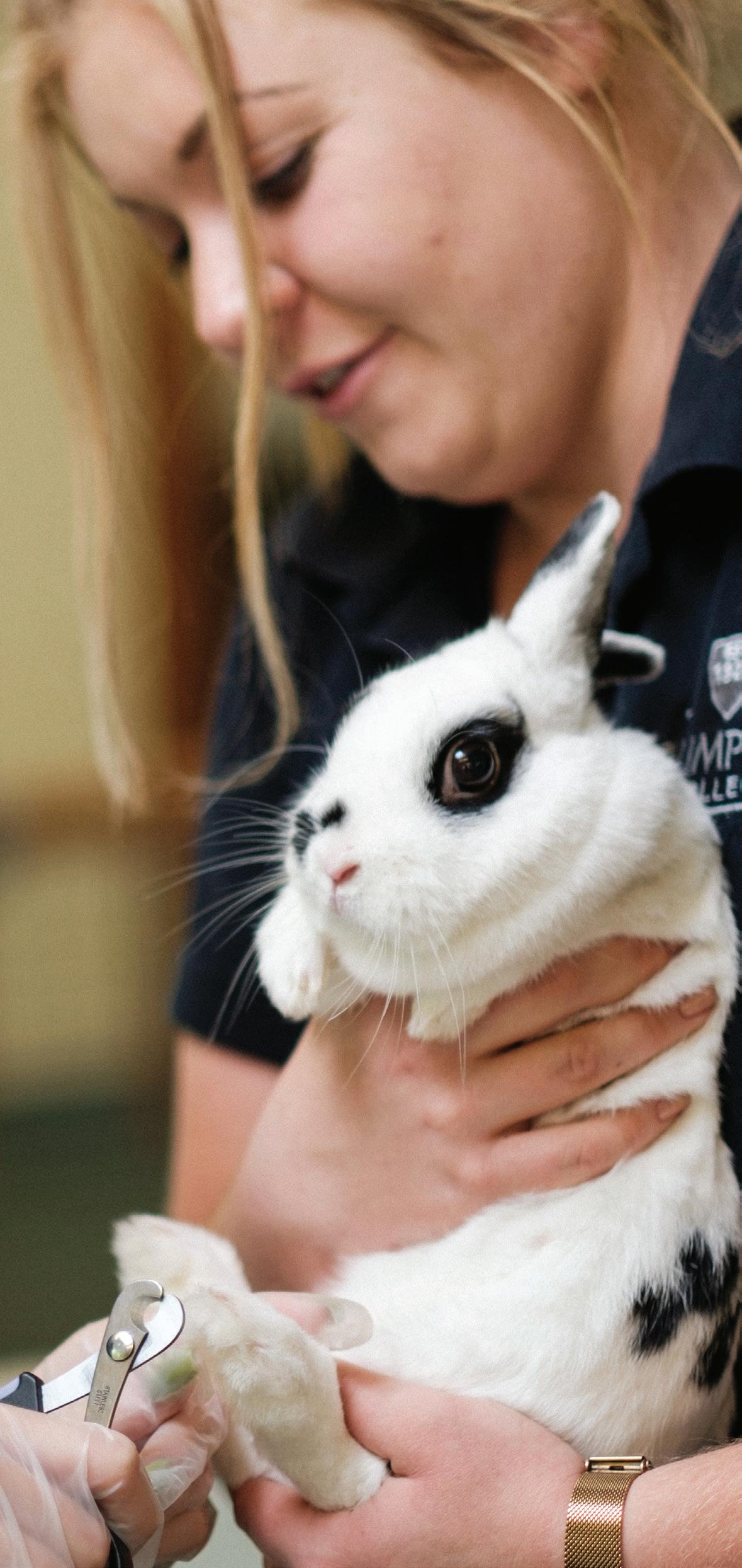
2. FUNDING BODY GRANTS
3. TUITION FEES AND EDUCATION CONTRACTS
4.
5. OTHER INCOME
The Corporation does not have any salary sacrifice arrangements in place. None of the staff involved in the restructuring were members of the Senior Management Team.
The average number of persons (including key management personnel) employed by the College during the period, analysed by category and described as full time equivalents, was as follows. This excludes agency, bank and short course lecturer fees.
Key management personnel are those persons having authority and responsibility for planning, directing and controlling the activities of the College and are represented by the Senior Management Team which comprises of the Principal, Deputy Principal, Two Vice Principals, Finance Director and Human Resources Director.
The number of key management personnel and other staff who received annual emoluments, excluding pension contributions and employer’s national insurance but including benefits in kind, in the following ranges was as follows. There is no performance related pay and all staff including the accounting officer receive the same cost of living pay award.
Total emoluments include amounts payable to the Accounting Officer, who is also the highest paid officer, the Principal and Chief Executive Officer.
The number of key management personnel and other staff who recei ved annual emoluments, excluding employer contributions to national insurance and pensions but including benefits in kind, in the following ranges was:
In addition to the above there are two part-time members of sta ff who received less than £60k in the year but would have received between £60k and £65k on a full-time basis, and one pa rt-time member of staff who is included above but would have received between £75k and £80k on a full-time basis
The pension contribution in respect of the Accounting Officer are in respect of employer’s contributions to the Teachers’ Pension Scheme and are paid at the same rate as for other employees. “Other emoluments” relate to the occupancy of the College property by the Accounting Officer for the better perform ance of his duties. This is a condition of his employment. The emolument is pensionable. The value of the emolument, i.e. the rental equivalence, is re-assessed every two years. However under the rules of the Teachers’ Pension Scheme the pensionable element of this residence emolument is capped at one-sixth of the Principal’s salary. The members of the Corp oration other than the Principal and staff members did not receive any payment from the institution other than the reimbursement of travel and subsistence expenses incurred in the course of their duties. The Principal’s expenses for the year w ere less than £5k.
body grants and Tuition fees include: OfS Income
for
(note 3)
9. INTEREST AND OTHER FINANCE COSTS
(note 2)
10. TANGIBLE FIXED ASSETS
Inherited land and buildings were valued for the purpose of the 1994 financial statements at depreciated replacement cost and subsequently under the transitional provision of FRS102 inherited land was revalued at 1st August 2014. Both revaluations were undertaken by firms of independent chartered s urveyors, in accordance with the RICS Statement of Asset Valuation Proactive and Guidance notes. Other tangible fix ed assets inherited from the Local Education Authority at incorporation have been valued by the Corporation on a depreciated replacement cost basis with the assistance of independent professional advice.
All fixed assets are owned by the College and accessed as requir ed by the Group under a facilities agreement.
The College inherited assets from the Local Authority following the 1992 Further and Higher Education Act and subsequently revalued some assets on adoption of FRS102. All non-land assets have been fully depreciated in the accounts.
Land revaluation of £2,516k is non-depreciable and held in the revaluation reserve
12. CREDITORS: AMOUNTS FALLING DUE WITHIN ONE YEAR
13. CREDITORS: AMOUNTS FALLING DUE AFTER MORE THAN ONE YEAR
14. MATURITY OF DEBT (a) Bank
14. MATURITY OF DEBT (continued)
(b) Finance leases
15. FINANCIAL COMMITMENTS
16.
NOTES TO THE FINANCIAL STATEMENTS For the year ended 31 July (£’000)
17. PROVISIONS
At 1 August 2023
Expenditure/additions in the period
At 31 July 2024
Defined benefit obligations relate to the liabilities under the C ollege’s membership of the Local Government Pension Scheme (Note 23).
18. TAXATION
The members of the Corporation do not consider the College is liable for any corporation tax arising out of its activities during this year.
19. CAPITAL COMMITMENTS
Construction is underway on the Institute of Technology project to be completed in 24/25 financial year, with total gross spend of £5.2M funded by a mixture of grants and a loan from the Secretary of State for Education
20. SUBSIDIARY UNDERTAKINGS
One Garden Brighton Ltd, a wholly owned subsidiary of Plumpton College was established in 2019 and began trading on 29th March 2021. At 31 July 2024 One Garden Brighton owed £1.034m (2023: £0.779m) to the College. The strategy for One Garden Brighton is to focus on continuous improvement towards generation of profit by, wherever possible, increasing revenue and more expedient control of expenditure to achieve beak-even within the shortest possible timeframe before moving into surplus and repaying the college in subsequent years
21.
Due to the nature of the College operations and the composition of the Corporation (being drawn from local public and private sector organisations) it is inevitable that transactions will take place with organisations in which a member of the Corporation may have an interest. All transactions involving organisations in which a member of the Corporation may have an interest, are conducted at arm’s length and in accordance with the College’s financial regulations and normal procurement procedures. Transactions with the Education and Skills Funding Agency are detailed (Note 2, 12, 13).
The College holds a 27% interest in Woodland Enterprise Ltd (WEL), a company limited by guarantee (£1). WEL owns a leasehold site and facilities at Flimwell, at which it is seeking to develop skills in wood production and use. The College previously appointed two directors (the Principal and the Estate Manager) to the WEL Board but both directorships have now ceased. It has an arm’s length sub-lease with WEL for two workshops on the site, and provides various management services to WEL. During the year rent was paid to WEL of £240 (2023 £240). This interest will end when the College disposes of the property, which is anticipated to occur in the 2024/25 financial year. The College owns the whole of the issued share capital of One Garden Brighton Limited amounting to £1 (1 ordinary share of £1) which was incorporated on 17th July 2019.
TO THE FINANCIAL STATEMENTS For the year ended 31 July (£’000)
None
Defined benefit obligations relate to the liabilities under the C ollege’s membership of the Local Government Pension Scheme (Note 23).
The College’s employees belong to two principal post-employment benefit plans: the Teachers’ Pension Scheme England and Wales (TPS) for academic and related staff; and the East Sussex Local Government Pension Scheme (LGPS) for non-teaching staff. Both are multi-employer defined-benefit plans.
The
for the year
The Teachers’ Pension Scheme (TPS) is a statutory, contributory, defined benefit scheme, governed by the Teachers’ Pension Scheme Regulations 2014. These regulations apply to teachers in schools, Colleges and other educational establishments. Membership is automatic for teachers and lecturers at eligible institutions. Teachers and lecturers are able to opt out of the TPS.
The TPS is an unfunded scheme and members contribute on a ’pay as you go‘ basis – these contributions, along with those made by employers, are credited to the Exchequer under arrangements governed by the above Act. Retirement and other pension benefits are paid by public funds provided by Parliament. Under the definitions set out in FRS 102 (28.11), the TPS is a multiemployer pension plan. The College is unable to identify its share of the underlying assets and liabilities of the plan.
Accordingly, the College has taken advantage of the exemption in FRS 102 and has accounted for its contributions to the scheme as if it were a defined-contribution plan. The College has set out above the information available on the plan and the implications for the College in terms of the anticipated contribution rates.
The valuation of the TPS is carried out in line with regulations made under the Public Service Pension Act 2013. Valuations credit the teachers’ pension account with a real rate of return assuming funds are invested in notional investments that produce that real rate of return. The latest actuarial review of the TPS was carried out as at 31 March 2020. The valuation report was published by the Department for Education (the Department) in April 2024. The valuation reported total scheme liabilities (pensions currently in payment and the estimated cost of future benefits) for service to the effective date of £262 billion, and notional assets (estimated future contributions together with the notional investments held at the valuation date) of £222 billion giving a notional past service deficit of £40 billion.
As a result of the valuation, new employer contribution rates were set at 28.68% of pensionable pay from April 2024 onwards (compared to 23.68% prior to that. DfE agreed to pay a teacher pension employer contribution grant to cover the additional costs during the 2023-24 academic year. A full copy of the valuation report and supporting documentation can be found on the Teachers’ Pension Scheme website.
The LGPS is a funded defined benefit Scheme, with the assets held in separate funds administered by East Sussex County Council.
The agreed contribution rates for future years are 18.9% for the College and range from 5.5% to 12.5% for employees, depending on salary according to a national scale.
The following information is based upon a full actuarial valuation of the fund at 31 March 2022 updated to 31 July 2024 by Barnett Waddingham LLP.
The current mortality assumptions include sufficient allowance fo r future improvements in mortality rates. The assumed life expectations on retirement age 65 are:
The college’s share of the assets in the plan at the balance sheet date and the expected rates of return were:
23. DEFINED BENEFIT OBLIGATION (continued)
The return on the Fund (on a bid value to bid value basis) for the year to 31 July 2024 is estimated to be 8.01%. The actual return on Fund assets over the year may be different. Based on the above, the Employer’s share of the assets of the Fund is approximately 0.44%.
Amount included in the balance sheet in respect of the defined benefit pension plan and enhanced pensions benefits is as follows:
Asset and Liability Reconciliation Changes in the present value of defined benefit obligations
Changes in fair value of plan assets
Change in demographic assumptions
Experience gain/(loss) on defined benefit obligations
College adjustment to surplus to achieve a nil balance sheet
McCloud/Sergeant Judgement
These accounts show a past service cost of £230 million in respect of the McCloud / Sergeant judgment which ruled that the transitional protection for some members of public service schemes implemented when they were reformed constituted age discrimination. This provision is just under 2% of the total scheme liability. The calculation of adjustment to past service costs, £7 billion, arising from the outcome of the Court of Appeal judgment is based on a number of key assumptions including: 1) The form of remedy adopted. 2) How the remedy will be implemented. 3) Which members will be affected by the remedy. 4) The earning assumptions. 5) The withdrawal assumption.
The other financial and demographic assumptions adopted to calculate the past service cost are the same as those used to calculate the overall scheme liability. Adopting different assumptions, or making other adjustments to reflect behavioural changes stemming from the judgment, would be expected to change the disclosed past service cost. Similarly, allowing for variations in individual members’ future service or salary progression is expected to produce higher costs. The past service cost is particularly sensitive to the difference between assumed long term general pay growth and the CPI. If the long term salary growth assumptions were 0.5% pa lower, then the past service cost disclosed here would be expected to reduce by 50% and conversely a 0.5% pa increase would increase the estimated cost by 65%.

Launching Spring 2025
Plumpton College is gearing up for the exciting launch of its new Veterinary Studies Centre in February 2025! This state-of-the-art £4.4 million facility, part of a major investment to future-proof the college, promises to transform training for aspiring veterinary professionals.
The centre will feature cutting-edge resources, including a hydrotherapy suite with a 7-metre pool, an underwater treadmill, and advanced classrooms. Students will gain hands-on experience in realistic, industry-grade settings, preparing them for careers in veterinary nursing, animal therapies, and more.
Recognised as one of the top providers of veterinary nursing training in the UK, Plumpton College’s new centre will offer unmatched opportunities for students to excel in their careers.

Our state-of-the-art hydrotherapy pool for canines.
Our new Veterinary Studies Centre due to open in February 2025.

“This exciting development continues the £25m investment into our future-focussed campus. It will transform this part of the estate to showcase modern, industry-leading practical resources and further enhances our student’s employability when they complete their studies.”
Deputy Principal, James Hibbert
Plumpton College is proud to celebrate its centenary in 2026 - a remarkable milestone marking 100 years of excellence in land-based education. Since its establishment in 1926, the college has cultivated generations of skilled professionals, nurtured innovation in agriculture and environmental sustainability, and fostered strong industry connections, preparing the next generation for a in-demand career in the landbased sector.
Over the last century, Plumpton has grown from a small agricultural school into a renowned institution offering a diverse range of courses in agriculture and food, viticulture, animal management, equine studies, horticulture, and more. It has become a cornerstone of the rural economy, empowering students with the skills and knowledge to shape the future of the land-based industries.
As we honour our rich heritage and look ahead to the next century, we have exciting plans to mark this huge milestone.





ANIMAL & VETERINARY SCIENCES
• FdSc Applied Animal Behaviour & Conservation
• BSc (Hons) Animal Behaviour & Welfare (Top-up)
• BSc (Hons) Animal Conservation & Zoology (Top-up)
• FdSc Veterinary Nursing
• BSc (Hons) Veterinary Physiotherapy
LAND & ENVIRONMENT
• FdSc Sustainable Horticulture Management
• FdSc Sustainable Land Management
• BSc (Hons) Sustainable Agriculture
• BSc (Hons) Rural Land Management
WINE STUDIES
• FdSc Wine Production
• FdSc Wine Business
• BA (Hons) International Wine
• BSc (Hons) Viticulture & Oenology
• MSc Viticulture & Oenology


